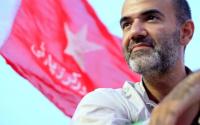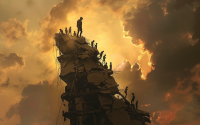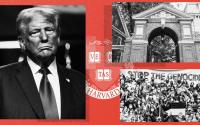by David EdwardsMedia LensApril 18, 2002
In his book, The More You Watch, The Less You Know, Mediachannel's Danny Schechter reports a study by the University of Massachusetts, which found that people who relied most on television news coverage knew least about the Gulf War and its origins. Study author, Professor Michael Morgan, reports: "Many of them also had the strongest opinions, which not coincidentally echoed precisely what they had been hearing. Like the media they depended on, they were virtually of one mind in uncritically embracing the US government position." (Quoted, Schechter, The More You Watch, The Less You Know, Seven Stories Press, 1997, p.42. http://www.mediachannel.org) Schechter explains why this is so: "We are bombarded with information, although if you look closely, most of it has a similar grammar, a similar focus and similar sources, all revolving around institutions and topics that most viewers admit in survey after survey they don't really understand. Politicians speak politician-speak; and people who hold real power or who make critical investment decisions or formulate behind-the-scenes strategies rarely speak at all. The world of news and the world of truth are often worlds apart." (ibid, p.43) In similar vein, in a report tucked away in the Education section of the Guardian, Greg Philo of Glasgow University Media Group reports research conducted into the effects of television reporting on public understanding of the Israeli-Palestinian conflict. A cross-section of people of different ages and backgrounds were asked a series of questions about the conflict and what they had understood from TV news. Most people (82%) listed TV news as their source and to a lesser extent newspapers. The research showed that many people had little understanding of the reasons for the conflict and its origins. It was apparent, Philo reports, "that this lack of understanding (and indeed misunderstanding) was compounded by the news reports". (Philo, 'Missing in action', the Guardian, April 16, 2002) The research focused on the lunchtime, early evening and late night news on BBC1 and ITN. The bulletins from September 28 until October 16, 2000 were transcribed and the number of lines of text that were devoted to different themes were counted. Of 3,536 lines of text, just 17 explained the history of the conflict. As a result, "it was apparent that many people did not understand that the Palestinians were subject to a military occupation and did not know who was 'occupying' the occupied territories". TV news journalists sometimes used the word 'occupied' but did not explain that the Israelis were involved in a military occupation. In the sample of 300 young people, 71% did not know that it was the Israelis who were occupying the territories. Only 9% knew that it was the Israelis and that the settlers were Israeli. There were actually more people (11%) who believed that the Palestinians were occupying the territories and that the settlers were Palestinian. Because only 17 of the 3,536 lines of text described the origins of the conflict, the public were unaware that Palestinian refugees were displaced from their homes and land when Israel was established in 1948. They did not know that war between Israel and its Arab neighbours in May 1948 forced more people to flee, and that many of the refugees moved to Gaza (which came under the control of Egypt) and to the West Bank of the Jordan river (under Jordanian control). Nor did they know that Israel fought a further war in 1967, occupying Gaza and the West Bank, thus bringing the Palestinian refugees under its military control. East Jerusalem, which has great religious and cultural significance for both Israelis and Palestinians, was also occupied (taken from Jordan). These military occupations were bitterly resisted by the Palestinians, in part because Israel built "settlements" all across the militarily occupied territories. The settlements give strategic and military control of the area and its water, the crucial resource in the occupied territories. Philo writes: "It would not have taken long on the news to say that much of the Palestinian economy depended on water and that each Israeli now consumed three times as much water as a Palestinian. Our interviewees knew very little of such matters." Nor are viewers aware that the ceaseless media portrayal of the US as a frustrated peacemaker seeking an honourable solution, is a deception. A typical, recent example of this casual propagandising appeared in the Guardian: "Hopes for peace in Israel were firmly pinned on the US secretary of state, Colin Powell, as he prepared to travel to Jerusalem today after receiving the backing of Russia, the EU and the UN secretary general, Kofi Annan, during a day of intense diplomacy in Madrid yesterday." (Giles Tremlett, 'Europe and UN pin hopes on Powell's visit - Declaration demands that Israel withdraw', the Guardian, April 11, 2002) In fact, as Normal Finkelstein writes, the US has consistently opposed a peaceful resolution to the conflict. At the Fifth Emergency Session of the General Assembly, convening in the aftermath of the 1967 war, there was "near unanimity" on "the withdrawal of the armed forces from the territory of neighbouring Arab states occupied during the recent war" since "everyone agrees that there should be no territorial gains by military conquest." (Secretary-General U Thant, summarizing the General Assembly debate. Quoted, Norman G. Finkelstein, 'First the Carrot, Then the Stick: Behind the Carnage in Palestine', ZNet site, April 18, 2002) The Security Council subsequently made the same demand for a full Israeli withdrawal in accordance with the principle of "the inadmissibility of the acquisition of territory by war" - inscribed in United Nations Resolution 242, alongside the right of "every state in the region" to have its sovereignty respected. Beginning in the mid-1970s, a modification of UN Resolution 242 provided for the creation of a Palestinian state in the West Bank and Gaza once Israel withdrew to its pre-June 1967 borders. Except for the US and Israel (and occasionally a US client state), an international consensus has backed the full-withdrawal/full recognition formula, or what is called the "two-state" settlement, for the past 25 years. The US cast the only veto of Security Council resolutions in 1976 and 1980 calling for a two-state settlement that was endorsed by the Palestine Liberation Organization (PLO) and front-line Arab states. A December 1989 General Assembly resolution along similar lines passed 151-3 (no abstentions), the three negative votes cast by Israel, the US, and Dominica. Finkelstein concludes: "The problem with the Bush administration, we are repeatedly told, is that it has been insufficiently engaged with the Middle East, a diplomatic void Colin Powell's mission is supposed to fill. But who gave the green light for Israel to commit the massacres? Who supplied the F-16s and Apache helicopters to Israel? Who vetoed the Security Council resolutions calling for international monitors to supervise the reduction of violence? And who just blocked the proposal of the United Nation's top human rights official, Mary Robinson, to merely send a fact-finding team to the Palestinian territories? "Consider this scenario. A and B stand accused of murder. The evidence shows that A provided B with the murder weapon, A gave B the "all-clear" signal, and A prevented onlookers from answering the victim's screams. Would the verdict be that A was insufficiently engaged or that A was every bit as guilty as B of murder?" Philo's report makes a mockery of the casual assumption made by many mainstream commentators, that the media does not 'dumb down', because the public are already dumb. Rod Liddle, former editor of Radio 4's Today programme and now regular Guardian columnist, writes: "There will be those who, like me, continue to sneer at TV simply because it is TV and for no real, logical reason... Television news is pitched at a greater intellectual level than that demanded of it by the viewer." (Rod Liddle, 'News to me', the Guardian, November 19, 2001.) Liddle adds: "The general level of intelligence is way higher in news than that demanded of it." But as Philo's report indicates, this cannot be so, because the level of intelligence in TV reporting is at rock-bottom - with almost no historical background or meaningful context, it is often literally incomprehensible. It is not possible to demand less than this. Returning to the catastrophe of the Israeli-Palestinian conflict, Philo summarises: "Without the discussion of origins and causes, we are left with accounts on the news of day-to-day events, in which it can appear that the 'normal' world is disrupted only when the Palestinians riot or bomb. This is of course the view of the Israeli government and the news tended to oscillate between this and the view that violence was perpetrated by both sides in a 'cycle' of 'tit-for-tat' killings. The Palestinians believe that they are resisting an illegal and violent occupation." In similar vein, Fairness and Accuracy in Reporting (FAIR: www.fair.org) reported that as of April 4, 2002, 300 Israelis and 1,200 Palestinians had been killed since the current Intifada began in September 2000. From the start of the Intifada through to March 17, 2002, the three major US networks' nightly news shows used some variation of the word 'retaliation' ('retaliated', 'will retaliate', etc.) 150 times to describe attacks in the Israeli-Palestinian conflict. About 79 percent of those references were to Israeli 'retaliation' against Palestinians. Only 9 percent referred to Palestinian 'retaliation' against Israelis. (Approximately 12 percent were ambiguous or referred to both sides simultaneously.) This disparity is significant, FAIR argues: "The term 'retaliation' suggests a defensive stance undertaken in response to someone else's aggression. It also lays responsibility for the cycle of violence at the doorstep of the party being 'retaliated' against, since they presumably initiated the conflict." (FAIR, 'In U.S. Media, Palestinians Attack, Israel Retaliates', April 4, 2002) Robert Fisk of the Independent reports the grim truth: "The Israeli line - that Palestinians are essentially responsible for 'violence', responsible for the killing of their own children by Israeli soldiers, responsible for refusing to make concessions for peace - has been accepted almost totally by the media." (Fisk, 'The biased reporting that makes killing acceptable', the Independent, November 14, 2000) Thus Philo reports one 18-year-old from a focus group as commenting: "You always think of the Palestinians as being really aggressive because of the stories you hear on the news. I always put the blame on them in my own head." And yet, on the same day that Philo's report was buried in the Guardian, the title of Jonathan Freedland's latest article in the same paper perpetuated the great, self-serving myth of UK media openness: "Most of the world sees Palestinians as the victims, but in Israel and the US events are given a different meaning." (Freedland, 'Parallel universes', the Guardian, April 17, 2002) Certainly in Britain, then, we "see the Palestinians as victims". And who has supplied this honest view? Why our courageous and honest media, of course - the TV bulletins and newspapers responsible for informing 82% of Philo's study group. Freedland's argument is symptomatic of a consistent and deeply-ingrained tendency to self-deception found among many 'liberal' journalists - because they know something, they believe everybody knows it. Moreover, they believe that they and the rest of the media have made sure everybody knows it. In the real world, journalists spend most of their time bombarding the public with context-free, garbled nonsense that promotes the approved establishment line through suggestion and psychological manipulation. The rest of the time, journalists just talk to each other. Stan Cloud, of the US Citizen Election Project, clarifies the problem: "For years, political journalists have been reporting primarily for themselves and have been doing so in a language ('spinmeisters,' 'soft money,' 'tracking polls') that a great many Americans find foreign and alienating." (Quoted, Schechter, op., cit, p.56) Thus the latest edition of Media Guardian provides a textbook example of how the media is viewed as having nothing at all to do with the ignorant public, being for media industry insiders only: "Media Guardian.co.uk: Text Alerts: Be the first to know about the latest developments in the media industry. Media alerts, covering advertising, broadcasting, new media, marketing, the City, press and publishing, are sent directly... to your mobile phone. Today find out if ITV Digital is going into receivership." (Guardian, April 15, 2002) John Pilger recently discussed the sham of 'media sections': "If the media pages did their job, they would set aside promoting the careers of media managers and challenge the orthodoxy of reporting a fraudulent 'war on terrorism'..." (Pilger, 'Should we go to war against these children?', the New Statesman, March 25, 2002) In Western democracies, we the people had better busy ourselves with voting for Pop Idols, mourning royalty and watching Reality TV, because politics is none of our business. But actually this is as it should be, or so our cultural elites tell us - politics is a sign, not of empowered, healthy citizens and a flourishing democracy, but of cultural primitivism: "Politics have withered away in this country, and that's a great tribute to its highly evolved character." (Martin Amis, Channel 4 News, May 31, 2000) Or consider the title of an article by Barry Cox in the (rightly) much-maligned Observer: "In defence of political apathy - voter disillusion with polls and politicians is little more than a sign of peace and prosperity." (Barry Cox, the Observer, July 16, 2000) Or as Madeleine Bunting managed to write, shortly after street protests by hundreds of thousands of US, British, and other passionately concerned citizens in Seattle (November 1999) and Washington (April 2000): "Let's be honest, who cares much about politics beyond a small elite of professional politicians, commentators, policy wonks and a rump of party activists? When did you last have a raging row - or even brief conversation - with anyone about politics?" (Madeleine Bunting, 'No politics, we're British', the Guardian, 15.5.00) But despite the standard promotion of apathy in the mainstream, things are changing. Robert Fisk - that rare fish, an honest mainstream reporter - is a brilliant and courageous critic of US policy in the Middle East. Fisk naturally expected a hostile reception when he recently paid his first visit to the American Midwest since 11 September, especially given that the theme of his talks and lectures was: "the cowardly, idle, spineless way in which American journalists are lobotomising their stories from the Middle East". (Fisk, 'Fear and Learning in America', the Independent, August 16, 2002) This was what Fisk experienced: "Three years ago, I managed to fill a Washington auditorium seating 600 with just 32 Americans. But in Chicago and Iowa and Los Angeles this month, they came in their hundreds - almost 900 at one venue at the University of Southern California - and they sat in the aisles and corridors and outside the doors. It wasn't because Lord Fisk was in town. Maybe the title of my talk - 'September 11: ask who did it, but for heaven's sake don't ask why' - was provocative. But for the most part they came, as the question-and-answer sessions quickly revealed, because they were tired of being suckered by the television news networks and the right-wing punditocracy. "Never before have I been asked by Americans: "How can we make our press report the Middle East fairly?" or - much more disturbingly - "How can we make our government reflect our views?" The questions are a trap, of course. Brits have been shoving advice at the United States ever since we lost the War of Independence, and I wasn't going to join their number. But the fact that these questions could be asked - usually by middle-aged Americans with no family origins in the Middle East - suggested a profound change in a hitherto docile population."
http://www.zmag.org/content/MainstreamMedia/edwards_palestine.cfm






